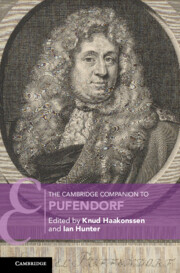Refine search
Actions for selected content:
9 results
5 - Property’s Elements and Scope
- from Part II - The Natural Right to Property
-
- Book:
- Natural Property Rights
- Published online:
- 17 April 2025
- Print publication:
- 24 April 2025, pp 82-104
-
- Chapter
- Export citation
1 - Barbeyrac’s Intervention
- from Part I - A Revolution in Rights?
-
-
- Book:
- The Cambridge History of Rights
- Published online:
- 22 January 2025
- Print publication:
- 28 November 2024, pp 15-44
-
- Chapter
- Export citation
2 - Hobbes and Pufendorf
-
- Book:
- Modern Moral Philosophy
- Published online:
- 10 June 2023
- Print publication:
- 15 June 2023, pp 39-86
-
- Chapter
- Export citation

The Cambridge Companion to Pufendorf
-
- Published online:
- 25 November 2022
- Print publication:
- 17 November 2022
1 - Introduction: Life, Work and Historical Context
-
-
- Book:
- The Cambridge Companion to Pufendorf
- Published online:
- 25 November 2022
- Print publication:
- 17 November 2022, pp 1-32
-
- Chapter
-
- You have access
- HTML
- Export citation
2 - Politics and the Constitution of the Empire
-
-
- Book:
- The Cambridge Companion to Pufendorf
- Published online:
- 25 November 2022
- Print publication:
- 17 November 2022, pp 33-59
-
- Chapter
- Export citation
10 - The Law of Nations
-
-
- Book:
- The Cambridge Companion to Pufendorf
- Published online:
- 25 November 2022
- Print publication:
- 17 November 2022, pp 236-262
-
- Chapter
- Export citation
5 - Human Nature, the State of Nature and Natural Law
-
-
- Book:
- The Cambridge Companion to Pufendorf
- Published online:
- 25 November 2022
- Print publication:
- 17 November 2022, pp 109-139
-
- Chapter
- Export citation
11 - A Science of State-Machines
- from Part IV - Germany: Law, Government, Freedom
-
- Book:
- To the Uttermost Parts of the Earth
- Published online:
- 05 August 2021
- Print publication:
- 26 August 2021, pp 797-872
-
- Chapter
- Export citation
